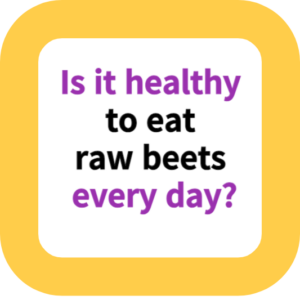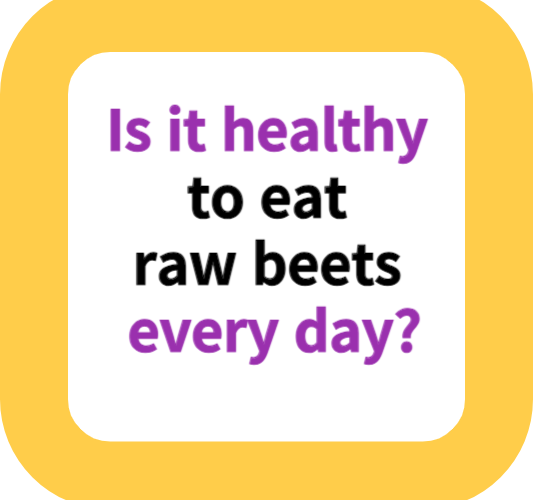Is it healthy to eat raw beets every day?
Welcome to our latest blog post where we delve into the fascinating world of raw beets, a humble yet powerful vegetable that has captured the attention of health enthusiasts worldwide.
In this comprehensive guide, we explore the nutritional richness of beets, their multitude of health benefits, and the potential risks associated with their excessive consumption.
From their substantial contribution to global sugar production to their impressive array of vitamins and minerals, we uncover how beets can positively impact your health, particularly in terms of cardiovascular and digestive well-being.
Yet, we also discuss the importance of moderation, especially for those with specific health concerns like diabetes. Additionally, we dive into the versatility of beets in culinary arts, highlighting their various forms and uses in everyday cooking.

Join us as we navigate through the colorful and nutritious journey of incorporating beets into a balanced diet, ensuring a harmonious blend of health benefits and delectable flavors.
Is it healthy to eat raw beets every day?

Introduction
The daily consumption of raw beets is a subject of growing interest in nutrition and health circles. This expanded exploration aims to thoroughly examine the various facets of incorporating raw beets into one’s diet, highlighting their nutritional values, potential health benefits, as well as the possible risks associated with their consumption.
Nutritional Profile of Beets
Beets are not just ordinary vegetables; they are a powerhouse of nutrition and sweetness, boasting a sugar content that ranges between 10% to 20%.
This high sucrose content makes them a significant contributor to the world’s sugar supply, with sugar beets alone accounting for about 35% of global sugar production. Beyond their sweetness, beets are also a calorically dense food. A serving of 100 grams of beets contains roughly 75 calories.
However, these calories are packed with nutrients, as beets are abundant in carbohydrates, proteins, dietary fiber, and essential vitamins such as A, B, and C. They also provide a rich source of minerals including potassium, phosphorus, sodium, iron, and magnesium, making them a versatile addition to any diet.
Health Advantages of Regular Beet Consumption
Regular consumption of beets can be a game-changer for health. They are a veritable treasure trove of fiber, vitamins, and minerals, which are crucial for maintaining a healthy immune system, supporting heart health, and ensuring proper nerve function.
The antioxidants present in beets are instrumental in safeguarding against cellular damage and mitigating inflammation. Furthermore, beets have notable cancer-fighting properties and contribute positively to cardiovascular health due to their abundance of folate and betaine.
The presence of lutein is another boon, offering protection against eye conditions like macular degeneration and cataracts. Additionally, the high fiber content in beets aids in promoting a healthy digestive system.

Potential Health Risks from Excessive Raw Beet Consumption
Despite their many benefits, the consumption of raw beets is not without potential drawbacks. One significant concern is their high oxalate content, which could contribute to the development of kidney stones in susceptible individuals.
In addition to this, consuming large quantities of raw beets might lead to digestive issues, such as bloating, gas, and in some cases, diarrhea. This is particularly likely if one’s diet was previously low in fiber.
Moreover, due to their high sugar and calorie content, excessive consumption of beets can inadvertently lead to weight gain. It is also crucial for individuals with diabetes to exercise caution, as the high sugar content in beets might not align well with their dietary needs.
Culinary Aspects and Varieties of Beets
Beets are incredibly versatile in the culinary world. They can be enjoyed in various forms – from raw in salads to being pickled or used in soups. Beet tops are not to be wasted either, as they make excellent additions to both soups and salads.
While sugar beets are primarily used in the production of refined sugar, it’s the red beet, particularly rich in Betanins, that is more commonly found in everyday diets. These Betanins are not just natural food coloring agents but are also beneficial for metabolic functions.
Conclusion
To sum up, while the daily intake of raw beets can bring numerous health benefits, moderation is key. Their rich nutritional profile supports a range of bodily functions and contributes to overall health, particularly in terms of cardiovascular and digestive health.
However, it’s important to balance their consumption with other vegetables to avoid the risks associated with their high sugar content and other potential side effects. A varied diet will ensure a more comprehensive intake of essential vitamins and minerals.
